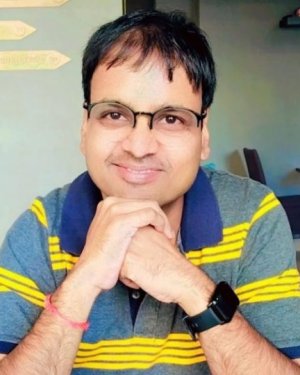Rahul Kesarwani, Ph.D.
- Group
- Physics Of Nanostructures Group
- Phone
- 95155 2885
- rahul.kesarwani@matfyz.cuni.cz
- Home page
- Teaching Schedule Exams
- Supervised and assigned theses
- Room / building
-
C 111,
1st floor,
Kryogenní pavilon,
V Holešovičkách 747/2, Praha 8 - ORCID
- https://orcid.org/my-orcid?orcid=0000-0002-6030-9726
- Others
-

About
I am currently a Marie Skłodowska-Curie Fellow (CZ) at Charles University, focusing on the growth of 2D materials, their heterostructures, optical characterization, and device fabrication. My research also includes the generation of twisted light (structured light) and its application in investigating the excitonic properties of 2D materials.
Before joining Charles University, I worked as a Postdoctoral Fellow at the National Taiwan Normal University, Taipei (Taiwan), where I studied the influence of the effect of excitonic properties of 2D materials using twisted light.
I hold a Ph.D. from Indian Institute of Technology Guwahati, Guwahati (India), and earned my BSc and MSc degrees in India.
Research Interests:
Condensed matter physics, Excitonic physics, Plasmonics, Nonlinear optics, Thin film growth.
Other Expertise:
Generation of structural light, Low temperature Photoluminescence/Raman, Two-photon absorption, AFM and Spectroscopy ellipsometry.
Publication:
- Rahul Kesarwani, Miroslav Veverka, Martin Zacek, Vaibhav Varade, Ladislav Fekete, Martin Kalbac, Jana Vejpravova, „Unveiling Giant Polarisation Ratio of Chiral Photoluminescence in MoS2 Nanorolligami Fabricated by Centre-to-Edge Rolling Mechanism“, Nanoscale Horizons, 7/2025
- Rahul Kesarwani, Shankar Khanal, Martin Zacek, Martin Kalbac, Jana Vejpravova, „Hybrid Plasmonic–Monolayer Transition Metal Dichalcogenide Heterostructures Obtained by Liquid-Assisted Origamization“, ACS Applied Nano Materials, 8, 12810 (2025)
- Rahul Kesarwani, Shankar Khanal, Martin Zacek, Miroslav Veverka, Vaibhav Varade, Petr Dolezal, Vaclav Holy, Martin Kalbac, Jana Kalbacova Vejpravova, “Investigation of Temperature-Dependent Structural and Magnetic Phase Transitions in CrCl3 Nanocrystals”, Journal of Alloys and Compounds, 1027, 180468 April (2025).
- Rahul Kesarwani, Varade Vaibhav, Slobodeniuk Artur, Kalbac Martin, and Vejpravova Jana, “Valley emission and upconversion in isotopically engineered monolayer WS2 under resonant excitation”, 2D Materials, 12, 025029 (2025).
- Rahul Kesarwani and Alika Khare, “Annealing Effects on Fractal Analysis and Optical Nonlinearity in Pulsed Laser-Deposited Plasmonic Cu Thin Films”, Plasmonics, 2025, 1 (2025).
- Yu-Chen Chang, Bipul Das, Yu-Fan Chiang, Wen-Hao Chang, Yen-Chun Chen, Rahul Kesarwani, Wen-Cheng Ke, Yann-Wen Lan, Ting-Hua and Lu, “Phonon polarization deformation in graphene induced by substrate coupling strengths”, applied physics letter 122, 032201 (2022).
- Nagendra Kumar, Biswajit Pathak, Rahul Kesarwani, Sumit Goswami, Alika Khare Boruah, and Bosanta R., “Experimental demonstration of in situ surface and thickness profile measurements of thin film during deposition using a grating array-based wavefront sensor”, Optics letter 47, 5509 (2022).
- Rahul Kesarwani, K.B Simbulan, T.D Huang, Y.F Chiang, N.C Yeh, Y.W Lan and T.H Lu, “Control of Trion-to Exciton Conversion in Monolayer WS2 by Orbital Angular Momentum of Light,” Science Advances 8, 1–8 (2022).
- Rahul Kesarwaniand A. Khare, Effect of annealing on the stoichiometry and plasmonic properties of PLD nanostructured semi-transparent copper thin film using BEMA, Journal of Materials Science: Materials in Electronics 33, 18209–18219 (2022).
- NB Bhagat, PP Padghan, Rahul Kesarwani, A Khare, KM Alti, “Electronic Speckle Pattern Interference Technique for measuring thickness of metallic nano thin films”, Materials Today: Proceedings, 50, 123 (2022).
- Rahul Kesarwani, P. P. Dey, and A. Khare, “Correlation between surface scaling behavior and surface plasmon resonance properties of semitransparent nanostructured Cu thin films deposited via PLD”, RSC Adv 9, 7967 (2019).
Book chapter:
Rahul Kesarwani, Partha P Dey and Alika Khare, “Anomalous Scaling Behavior of Cu Film via Pulsed Laser Deposition and Correlation with SPR Properties,” Advances in Science and Technology Volume-II, McGraw Hill Education Chapter 11, 61 (2020).
International patent:
“System, apparatus and method for monitoring of surface profile and thickness measurement in thin films”
• European Patent: Bosanta Ranjan Boruah, Alika Khare, Biswajit Pathak and Rahul Kesarwani, Patent Application No.: 16872494.6, Publication No.: EP 3 387 482 B1, Publication Date: 17/10/2018.
• Japanese patent: Bosanta Ranjan Boruah, Alika Khare, Biswajit Pathak and Rahul Kesarwani, Patent Application No.: JP, 2018–549636, Registration No.: JP6838075B2, Grant Date: 03/03/2021.

